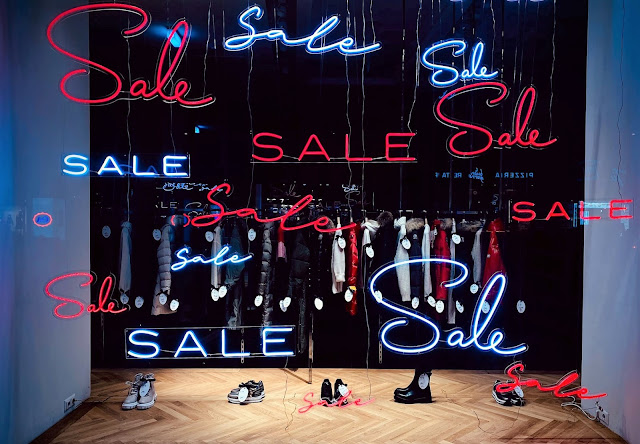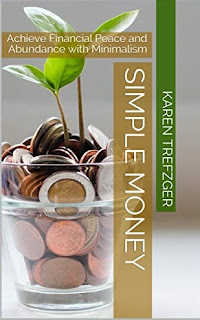9 Ways to Free Yourself from the Trap of Consumerism
But consumerism is a social and economic order that "encourages the acquisition of goods and services in ever-increasing amounts," according to Wikipedia. It's that last phrase that should grab our attention.
Our society teaches us that we should consume more and more as time goes by. We aren't supposed to establish a sustainable level of consumption, but are expected to meet increasing desires. By almost every measure, we consume more per person now than we did 60 years ago, yet most of us still have long lists of things we want or believe we need.
Our supposedly "robust" economy requires us to be forever unsatisfied with what we have!
We have to consume in order to survive, but we don't have to consume an ever-increasing amount, even if everyone expects us to. We don't have to compromise health, finances, time, or the ultimate purpose of our lives to serve consumerism.
The symptoms of consumerism
How do you know if you're caught in the trap of consumerism?
1. You buy more than you planned. You leave your house with a shopping list, but consistently return with items you didn't intend to purchase.
2. You run out of storage space. Okay, maybe you live in a really tiny home, or you're buying items for an upcoming special event, or you just have a tendency to be disorganized. But if you routinely bring home items that don't have a designated spot to belong, you're probably consuming too much.
3. You buy things you already have. If you regularly buy things that you discover you already have at home, your purchases may be impulsive, and it's safe to say you're suffering from consumerism.
4. You routinely seek approval for your purchases. There's a difference between seeking information or feedback in order to make an informed purchase, and looking for approval after the fact. If you need to find ways to justify your purchases, or brag about what a great deal you got, you're probably buying things you don't need.
5. You regularly go over your budget. Of course things happen that you can't foresee, or prices are higher than you expected. But if you've set a realistic budget and often go over it, you're probably consuming excessively.
6. You buy things on credit. Some people can be wise about how they manage credit to earn points and benefits. But if you're like most of us, you use credit cards to buy things you can't actually afford.
7. You regret purchases. One of the more obvious signs that you have a problem with consumerism is that you regularly feel buyer's remorse.
8. You rely heavily on return policies. You might buy items to see if they meet your needs, returning them if they don't. But if you buy things with the idea "Oh well, I can always return it," you may be buying stuff you don't really need or can't afford. If you're dependent on a liberal return policy, you're probably overconsuming.
9. You hide purchases. Not much to say here. If you're ashamed of your purchases or use them in secret, you're caught in the trap of consumerism.
Do you have any of these symptoms? If not, good for you! But you may know someone who does. And if you're suffering from consumerism, read on for strategies you can use to help yourself recover.
9 strategies to curb consumption
When we buy more than we need, we're probably making impulsive decisions. We're buying with our emotions instead of our minds. But by making a list of what we need or want, we give ourselves time to consider each purchase.
If you feel an urgency to buy something, figure out why.
- Is the urgency a result of an event you can't control? You may legitimately need the item, but maybe you can borrow it, rent it, or look for a second-hand option.
- Is the urgency a result of poor planning (i.e. no toilet paper in the house because you forgot to put it on your list when you shopped last week)? You may need to buy it now, but how can you prevent this situation in the future?
- Is the urgency a result of clever marketing, a sale, an eye-catching display, or some other situation that provokes an emotional response? Use your list. Write the item on it, and give yourself a day, or three, or even seven to think about or research the purchase. Is this too much trouble? Do you even remember the item a week later? Maybe you don't need to buy it after all.
By slowing down, you give yourself the chance to be intentional rather than emotional about your purchases, reducing the chances that you'll buy something destined to become clutter.
2. Make it harder.
Shopping can be fun. We enjoy those dopamine hits that come as we anticipate getting a reward. And if the item we want to purchase is on sale, the pleasure can be even greater. Our decision to buy happens in a split second.
Want to be more intentional? Make it harder to shop. Unsubscribe from email lists and sales notifications, remove your credit card details from websites (and stop carrying one in your wallet), and stop browsing in tempting stores.
You could decide to buy only used items, which shrinks your options and makes the hunt more difficult (and more rewarding when you find what you need). Decide to buy clothes made only from recycled or organic materials. Buy food, cosmetics, cleaning supplies and more that are sustainably and ethically produced.
With these requirements in mind, your typical trip to the big box store may become less tempting than usual.
3. Reconsider media consumption.
Several studies link media consumption with increased materialism, and that makes sense. The vast majority of media are owned by for-profit corporations. Whether TV, movies, radio, print media, or social media, they make money by selling advertising, and the purpose of advertising is to sell you products.
So the more media you consume, the more you'll be tempted to shop. Celebrities and other influencers make owning all of those products look wonderful and life-enhancing. Of course you want to join in, if only to look like all of your peers.
Does this mean you shouldn't consume any media? I'm not suggesting that. But become more aware and thoughtful. If you reduce the time you spend immersed in those platforms, you'll also reduce feelings of envy and desire.
4. Declutter to discover the truth.
Think back to the last time you moved house. Did you have to pack up much more than you expected? Did stuff just keep appearing out of drawers, closets, and other storage areas like scarves from a magician’s sleeve?
The amount of clutter you have betrays your consumption habits.
Instead of waiting to move, declutter now. Reveal your temptations and behaviors so you can start to manage them better.
Related article: 10 Tiny Decluttering Tasks With Big Results
This might start with resisting the desire for that new handbag or pretty dinnerware, but it continues with proper cleaning and storage, maintenance, repair, reuse, and upcycling.
If you have the skills to darn your sweater or paint your furniture, you might be doing this already. Maybe you have a handy friend or relative who'll be happy to do a bicycle tune-up or help you upstyle some thrift store clothes. Or you can pay a professional to re-heel your shoes or refurbish your old iPhone.
Respect your useful possessions, reduce consumption, and benefit the environment too.
6. Say "no thanks."
- Your friend offers you their pasta maker.
- You get a Secret Santa gift from work.
- Your insurance agent gives you a calendar.
- Your child gets a cheap toy with his Happy Meal.
- The school fundraiser provides a tee shirt.
What's the downside of freebies? After all, these are generous acts. And if the items add value to your life, then you can accept the kindness. But saying yes to things you don't want or need adds to your clutter and sets a pattern for adding more stuff without thought.
So change your default response. Give yourself time to consider before you automatically say yes.
7. Practice "one in, one out."
The idea of "one in, one out" is not to let you go on shop/declutter/shop binges. It doesn't mean you should buy new home décor, only to donate that and buy all new stuff next year. This demonstrates a spending problem that keeps you in debt and generates huge amounts of waste. I was stuck on this merry-go-round myself for quite a while.
But once you declutter and create a designated spot for each of your belongings, "one in, one out" becomes more useful.
For example, before you decide to buy new shoes, look at your shoe storage situation. Do you have space on your shoe rack for a new pair? If not, you need to create space by getting rid of an existing pair. This can help you decide if buying is a worthwhile decision.
You no longer keep adding items you can't accommodate. You become more intentional about what you bring into your home, because you'll probably have to get rid of something else first.
Related article: It's Worth Your Effort to Make a Place for Everything
8. Change what you splurge on.
Instead of treating yourself to fast food, fast fashion, made-in-China home décor, or yet another tech gadget, spend your money on an experience. Go out to dinner at that new highly-rated restaurant, buy tickets to a concert you'll enjoy and remember, or save up for a trip to somewhere you've been longing to visit.
Stop wasting money on impulse for a quick thrill, and get satisfaction from anticipating a chosen and planned-for luxury.
Being generous not only meets the needs of others, but it does some great things for you too. Helping others has been linked to increased self-esteem, longer life expectancy, lower stress levels, less depression, and overall happiness.
Why not redirect at least some of the money you spend shopping for stuff you don't need toward meeting real needs in the world?
- Do a 30-day Buy Nothing challenge with a friend, and donate some of the money you save to a favorite charity.
- Sponsor someone in their fund-raising walkathon, jogathon, bikeathon, etc.
- Give up just one thing for 30 days (Starbucks, alcohol, clothes shopping, a streaming service, etc.), calculate how much you'll save, and divert that money to your local homeless shelter or food closet.
I think you'll get more satisfaction and sense of purpose from generosity than you ever get from shopping!
Simple Money can help you
- discover your money beliefs and how they influence your financial decisions
- make a budget that lets you focus on your needs and find a way to afford your desires
- buy less and demolish debt
- feel empowered, not poor, as you control your spending
- increase enjoyment and satisfaction without spending money
- and so much more!
We work too hard to wonder where all our money went. Life is better when we use money to achieve our dreams, and Simple Money can help you along the way.
* This blog is reader-supported. If you buy through my links, I may earn a small commission.








Comments
Post a Comment